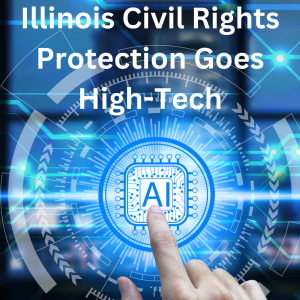Recently, Illinois Governor Pritzker signed H.B. 3773 into law, marking a significant expansion of the Illinois Human Rights Act to include specific regulations on the use of artificial intelligence (AI) in employment decisions. This move reflects the state’s ongoing commitment to civil rights protection, now extending into the realm of advanced technology.
What Does H.B. 3773 Mean for Your Business?
This amendment to the Illinois Human Rights Act is a landmark step in regulating the use of AI by employers in Illinois. The new law requires employers to be transparent with their employees and job applicants about the use of AI in employment decisions, such as hiring, promotion, or termination. Specifically, this means that:
Disclosure Requirement: Here is the key provision…..Illinois Employers must inform individuals if AI technology is being used to analyze their suitability for a position. This disclosure must be clear and provided before any AI assessment occurs.
Anti-Discrimination Mandate: The law prohibits the use of AI tools that result in discriminatory practices against any individual based on protected characteristics such as race, gender, age, disability, or other factors. This is in line with the existing protections under the Illinois Human Rights Act, now extended to cover AI-driven decision-making.
Accountability for AI Outcomes: Employers will need to ensure that their AI tools are not only transparent but also fair and non-discriminatory. This may involve auditing and validating AI systems to ensure they comply with the new legal standards.
Implications for Employers
The expansion of the Illinois Human Rights Act to cover AI regulation represents a significant shift in how businesses must approach their hiring and employment practices. Here’s what you need to know:
- Compliance is Key: Non-compliance with the new AI regulations can result in legal challenges and penalties. It’s critical that businesses review their current AI tools and practices to ensure they meet the new standards. This may involve working with legal and technical experts to audit AI systems.
- Training and Education: Employers should consider training their HR teams and decision-makers on the implications of using AI in employment decisions. Understanding both the potential benefits and risks of AI is crucial in navigating this new legal landscape.
- Monitoring and Adaptation: As AI technology continues to evolve, so too will the regulations surrounding its use. It’s important for businesses to stay informed about any further changes in legislation and to adapt their practices accordingly.
Moving Forward
This expansion of the Illinois Human Rights Act underscores the growing intersection between technology and civil rights. As AI becomes more prevalent in business operations, particularly in employment decisions, it’s imperative for Illinois businesses to prioritize transparency, fairness, and compliance.
If your business is currently using or considering the use of AI in employment practices, now is the time to assess your systems and ensure they align with the new requirements. As always, it’s advisable to seek legal counsel to navigate these changes and avoid potential pitfalls.
Conclusion
The integration of AI into the workplace presents exciting opportunities but also significant challenges, particularly concerning compliance with evolving legal standards. As a business operating in Illinois, it’s essential to stay informed about new legal developments that could impact your operations and employment practices. By staying informed and proactive, Illinois businesses can harness the power of AI while upholding the highest standards of civil rights protection.
For any questions or assistance regarding the implementation of AI in your employment practices, or to ensure compliance with the newly expanded Illinois Human Rights Act, please feel free to contact our office. Bellas & Wachowski is here to help Illinois business owners navigate these complex issues and safeguard your business against potential legal risks.
 Chicago Business Attorney Blog
Chicago Business Attorney Blog


